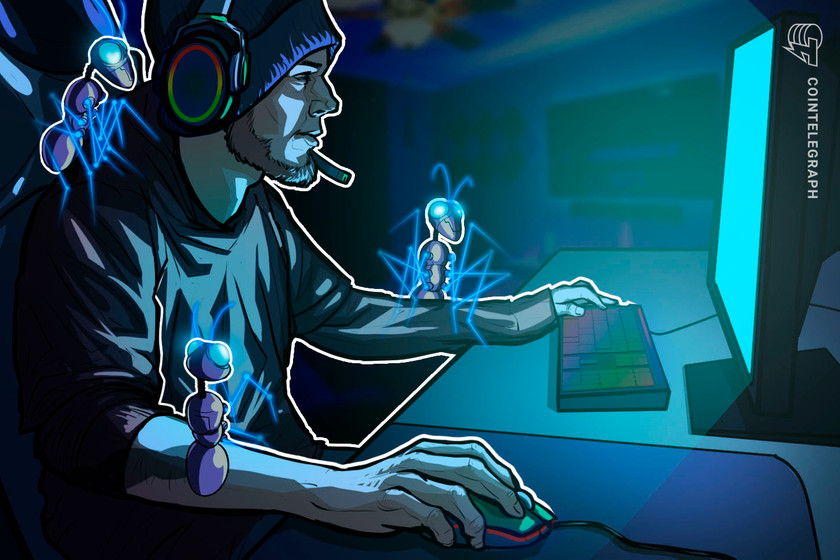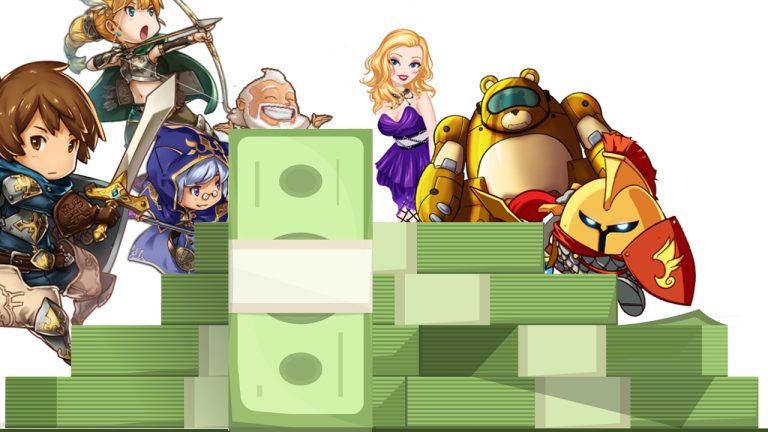
Blockchain gaming tokenomics may have got a bad wrap last cycle, but GameFi execs say it’s not going away anytime soon as it’s one of the key ways to build a player base.
Despite lingering resistance from some gamers over “tokenomics,” gaming studios will most likely continue to use airdrops and other incentives to attract players, according to industry executives.
“It’s a very easy way to get market share, said Kieran Warwick, founder of gaming studio Illuvium in an interview with Cointelegraph.
However, games that fail to deliver on the fun, or gameplay aspect, are still doomed to fail, said Warwick.
 Axie Infinity Origins, the blockchain-based, play-to-earn (P2E) game, has successfully cleared Apple’s rigorous App Store review process and the game’s app is now available for Apple iOS users. Sky Mavis, the creator behind Axie Infinity, has adopted a strategic approach by rolling out the game’s app in stages, with targeted release plans for various Latin […]
Axie Infinity Origins, the blockchain-based, play-to-earn (P2E) game, has successfully cleared Apple’s rigorous App Store review process and the game’s app is now available for Apple iOS users. Sky Mavis, the creator behind Axie Infinity, has adopted a strategic approach by rolling out the game’s app in stages, with targeted release plans for various Latin […] After recording $4.26 billion in total non-fungible token (NFT) sales, the play-to-earn game Axie Infinity’s monthly player count has dropped to levels not seen since November 2020, a period of 26 months. Despite the low player count, the project’s native token, AXS, has climbed 62% higher against the U.S. dollar in the last 30 days. […]
After recording $4.26 billion in total non-fungible token (NFT) sales, the play-to-earn game Axie Infinity’s monthly player count has dropped to levels not seen since November 2020, a period of 26 months. Despite the low player count, the project’s native token, AXS, has climbed 62% higher against the U.S. dollar in the last 30 days. […]
Gameplay improvements will be the biggest driver of blockchain gaming adoption in 2023, according to a survey from the Blockchain Gaming Alliance.
The blockchain gaming industry is experiencing a "massive shift," with the once-popular play-to-earn (P2E) model falling out of favor and focus directed now at improving gameplay experience, a new survey has found.
The survey results were included in a newly released annual report from the Blockchain Game Alliance (BGA) on Jan. 12, which was conducted with 347 professionals, representing 252 different projects or companies in the blockchain sector.
Most of the respondents were young adult males working for blockchain gaming companies in middle and top management positions, according to BGA.
One of the trends gleaned from the report was an apparent shift in how blockchain gaming executives viewed P2E as a driver for blockchain gaming adoption.
In 2021, the report found 67.9% of respondents agreeing that P2Es would be the most significant growth driver of blockchain gaming. The latest survey found this number shrinking to just 22.5%.
Instead, gameplay improvements was seen as the biggest driver for adoption in 2023 with 35.7 of respondents saying gameplay improvements will be the industry's top priority.
Pedro Heddera, head of research and analytics at Dapp insights company Dappradar cited P2E’s fading out as a result of “falling crypto prices and upcoming free-to-earn games” paving the way for the new generation of web3 games, adding:
“2023 is shaping up to be a make-or-break year.”
Co-founder of web3 consulting company Blockminds Rowan Zwiers stated in the report that despite the previous hype achieved by P2E games during the first generation of blockchain gaming, the industry is currently in the midst of a “drawback to normalcy.”
Zwiers said that P2E models have “proven themselves unsustainable” but showed the need for the development of the next generation of more advanced blockchain gaming dynamics.

Meanwhile, Chief Investment Officer of Hartmann Metaverse Ventures Felix Hartmann said that “cheap point-and-click browser” P2E’s are no longer getting the funding they used to get as “capital has gotten smarter and more demanding.”
Hartmann suggested that venture capitalists are turning their attention to a better experience for gamers. He noted:
“More cutting-edge game studios integrating web3 and AI into Unreal Engine-based, high-fidelity games are seeing more traction.”
Despite the decline in popularity for P2E’s, co-founder of Mirai Labs Corey Wilton said that the “lovers” of the original P2E model will always exist, but it is clearly more profitable to create games that “captures the casual everyday gamer.”
The report highlighted that poor gameplay and the problem of blockchain gaming concepts not being understood were the biggest issues in blockchain gaming.
Related: 2023 will see the death of play-to-earn gaming
Overall, the blockchain gaming industry is still growing significantly, despite the extended crypto winter, according to a section of the report supported by DappRadar.
On-chain game transactions reached 7.4 billion, growing 37% from 2021 and a staggering 3,260% since 2020.
The report stated that the crypto winter has not impacted the number of blockchain gamers for existing games.
President of the Blockchain Games Alliance Sebastien Borget said this indicates to him that the industry is “putting players first,” more so focusing on the benefits of blockchain to the gaming industry over the volatile market.

Big gaming firms are working to spur mainstream blockchain gaming adoption, and don’t want to “change that policy” even if it causes pushback from some.
Japanese gaming giants are positioning for mainstream blockchain game adoption, and will not be swayed by the section of gamers that are against crypto and nonfungible tokens (NFTs), an exec from the Oasys blockchain project told Cointelegraph.
Speaking to Cointelegraph at the 2022 Tokyo Games Show last week, Oasys Representative Director Ryo Matsubara emphasized that the project’s big-name partners such as Bandai Namco, Sega and Square Enix are not just jumping on the crypto bandwagon —there's a long-term vision for blockchain-based Play-to-Earn (P2E) gaming:
"We have a shared vision about blockchain at the executive level. They don't [want to] change that policy. They really understand the future adoption of blockchain. They're not thinking about, you know, just the revenue, they want to create the next future [of gaming].”
Bandai Namco has developed beloved titles such as Tekken and Pac-Man, Sega’s most famous title is generally seen as Sonic the Hedgehog, while Square Enix is the developer of the widely popular Final Fantasy franchise.
Questioned whether these companies are looking to integrate blockchain tech with their current gaming franchises, Matsubara suggested that they are initially looking at developing brand new blockchain games instead.
He noted that as this is a completely “new model” of gaming, it needs more time to mature before these big companies will look at broader blockchain integrations with traditional games.
“When the model is fixed, becomes sustainable and successful, then strong [popular] IP will be added,” he said.
Looking at what needs to be improved in blockchain gaming, Matsubara noted that a “big problem” so far is that many projects are too dependent on the price of in-game tokens. As a result, there is more demand for “speculation” rather than the gameplay itself.
He went on to note that there will be an “adjustment” over time as projects work to develop genuine hype for the games themselves, most likely by improving the overall gaming experience.
Related: Japanese gov't issues NFTs to reward local authorities' work
This echoed similar sentiments to the lead community manager at Australia-based game developer and Animoca Brands subsidiary Blowfish Studios Luke Sillay, who was also at the event.
During an interview with Cointelegraph, Sillay emphasized that more people want games that are actually “fun to play” rather than just a hustle to earn tokens.
Oasys’ proof-of-stake blockchain is geared directly towards gaming and is tentatively set for an official mainnet launch in the remaining months of this year. Matsubara also hinted that games from its big-name partners will likely be announced next year.
Looking outside Japan, major western gaming companies such as Fortnite developers Epic Games have increased exposure to blockchain gaming of late. Last week the Epic Games store listed a new free-to-play NFT game called Blankos Block Party by Mythical Games.
The move follows comments from Epic Games CEO Tim Sweeney in July, in which he stated that his company “definitely” wouldn’t follow Microsoft’s Minecraft in banning NFT integrations in games.

Once blockchain games can offer a similar experience to League of Legends or Fortnite they will become more popular, argues Blowfish Studios' Luke Sillay.
Blockchain-based games need to spend more time actually being “fun to play” rather than developing flashy tokenomics, an Animoca Brand-owned blockchain game developer told Cointelegraph.
Speaking to Cointelegraph on the first day of the 2022 Tokyo Games Show, Luke Sillay, the lead community manager at Australia-based game developer Blowfish Studios said that far too many blockchain games have put the focus on in-game rewards and tokenomics rather than gameplay.
“You can see from a lot of other blockchain games that they're not actually fun to play. Like, yes, you have potential to earn quite a significant amount of token and you get a good return on investment most of the time. But generally speaking, they're not that fun, right?”
Sillay said that generally, many of these games have simplistic game modes that are built around earning, rather than pure enjoyment, and have therefore failed to grasp the attention of traditional gamers thus far.
According to data from DappRadar, the most popular blockchain games in terms of active users over the past 30 days are Gameta, Alien Worlds, and Solitaire Blitz with one million, 814,000, and 652,760 users, respectively. The figures show significant interest in the games but pale in comparison to popular traditional games.
Sillay said games should primarily be “fun to play” and attractive to look at, stating:
“Our kind of thought is that if it's fun to play and it's attractive to look at, people want to play it."
Blowfish Studios is an Australian video game developer that was acquired by Animoca Brands for around $6.6 million in July 2021. As part of the acquisition, Animoca has guided Blowfish from Web2 to Web3 gaming, with NFT game Phantom Galaxies (currently in Beta) being the company’s main focus.

Questioned on the type of games that would work best with NFTs and P2E integration, Sillay highlighted free-to-play giants such as Riot’s League of Legends and Epic Games’ Fortnite which already have internal markets built into them.
He noted that these types of games generally attract die-hard fans because they are fun to play, and continually update and improve the experience over time. This leads to people who play for multiple years and happily spend money to purchase products such as new character skins.
“Say like League of Legends and Fortnite with your skins and stuff like that [...] If you can play and enjoy something for a really long time, you know, and then you drop it, in a year or two in, you don't really have much to show for it. But if you do that with blockchain, you can potentially sell all the assets you've earned,” he said.
Sillay went on to note that there are some barriers to entry in blockchain games that may be putting some people off, and that if the onboarding process can be ironed out this could attract new users.
“It's a very daunting thing trying to learn about this whole new technology, creating a wallet etc, and there are so many words in blockchains that mean completely different things,” he said.

Phantom Galaxies is an open-world mecha-robot shooter game expected to have an official early access launch in Q4 2022. Its in-game NFTs have already seen a high level of demand, with more than 517,000 owners of its Origin Collection according to OpenSea. The project also concluded a private NFT sale in May that fetched an estimated $19.3 million.
Related: Animoca confirms $110M round led by Temasek, plans new acquisitions
At this stage, Phantom Galaxies requires just one NFT to get started, making it a relatively straightforward process to get involved.
“Then the rest is actually at the moment just like a traditional game basically,” Sillay said.
 Blockchain gaming publisher Animoca Brands announced the company has raised $110 million in a funding round led by Temasek, Boyu Capital, and GGV Capital. The company raised the funds by issuing convertible notes to a handful of institutional investors. Animoca Brands Raises $110 Million From Strategic Investors Animoca Brands has raised another $110 million this […]
Blockchain gaming publisher Animoca Brands announced the company has raised $110 million in a funding round led by Temasek, Boyu Capital, and GGV Capital. The company raised the funds by issuing convertible notes to a handful of institutional investors. Animoca Brands Raises $110 Million From Strategic Investors Animoca Brands has raised another $110 million this […]
Play-to-earn games struggle to retain users, which is exactly why one analyst says they need to focus on function over fun.
Play-to-earn (P2E) blockchain-based games gathered investors’ attention in late 2021, with Axie Infinity leading the pack with over 2 million active users. In P2E games, players are awarded tokens or nonfungible token assets (NFTs) as they progress throughout the game. These digital assets can be sold using marketplaces and cryptocurrency exchanges, generating income in a decentralized manner.
However, there is a large discrepancy between P2E and traditional PC and console gaming experiences. In that sense, crypto games are a couple of decades behind due to the restrictions imposed by blockchain technology.
Although the promise of AAA-level crypto games eventually developing exists, so far, most of the launches gravitate toward digital trading card battles, decentralized finance disguised as role-playing games, and collectibles.
Unsurprisingly, crypto games critics focus on the lack of fun, or a comparable user experience versus the traditional market, as pointed out by analyst Udi Wertheimer.
“ayyy what are you doing tonight let’s play the new crypto game together!”
— udiverse (@udiWertheimer) August 2, 2022
said no one ever
because crypto games aren’t fun
and also don’t exist
According to Anton Link, the CEO of NFT renting and leasing protocol Unitbox Protocol:
Unlike most Web2 titles, fun is not what play-to-earn gamers aim for. Their main goal is to make a profit and be the first to gain new valuable experience that they can effectively use as a guild or cybersports team member to monetize their time.
In terms of adoption, the traditional gaming industry beats the movies and TV entertainment by a large margin. A recent report from Newzoo suggested that the video games market will reach $200 billion in 2022, a 5.4% increase year-over-year. In addition, the report states that the gaming segment entices 3 billion players, far higher than the estimated 320 million crypto users worldwide.
Even if Wertheimer’s remarks are correct, meaning the demand for crypto games will remain sluggish, capturing a mere 0.5% of this segment equates to 16 million users. Moreover, there’s nothing impeding someone from seeking some form of revenue in P2E and, separately, enjoying traditional games on consoles, PCs and mobile apps.
In regards to the potential expanding P2E user base, Anton Link, the Unitbox Protocol CEO said:
I think NFT blockchain games and the GameFi sector will be the key drivers of the industry in the next few years - and will also become a vehicle for the mass transition of new users to the crypto industry through new NFT-based DeFi products.
There’s a considerable difference between collectible NFTs and in-game avatars, armors, weapons, land, and spaceships. Likely the prejudice against P2E games comes from the 67% decline in NFT trading volume from May 2021 to July 2021, according to data from DappRadar. Furthermore, Axie Infinity has been plagued by a massive $600 million Ronin bridge hack on March 29.
There’s plenty of valid criticism for the crypto gaming industry, and forcing users to buy items or tokens sits near the top of this list of complaints. However, one should note that the multiple decentralized finance (DeFi) applications are disguised as games, such as “DeFi Kingdoms,” “Farmers World” and “Sunflower Land.” In these cases, expecting free compensation without any initial investment would be weird.
Despite the challenges in onboarding users and creating sustainable in-game economies with sufficient incentives, Link explained that, “It will only be a matter of time before institutions start lending against NFTs.”
He elaborated with:
Once the institutional lending infrastructure is in place, we expect the demand for NFTs to rise as well, as institutional money can flood into the country due to the additional utility that comes from securing their NFTs.
Maybe, in the near future, players will no longer have to buy digital monsters and spaceships before adventuring in P2E. Even though there’s valid criticism for the crypto gaming industry, a 10x increase in active players to 16 million is not far-fetched. More importantly, this growth and the new models supporting it do not need the same user experience provided by traditional games that don’t require interaction with blockchains.
The views and opinions expressed here are solely those of the author and do not necessarily reflect the views of Cointelegraph. Every investment and trading move involves risk. You should conduct your own research when making a decision.
 After recording more than $4 billion in all-time sales, Axie Infinity announced the game’s classic mode will no longer allow users to obtain smooth love potion (SLP), as SLP rewards have been added to the new Origin ranked gameplay mode. The team also introduced non-fungible token (NFT) runes and charms that can be minted on […]
After recording more than $4 billion in all-time sales, Axie Infinity announced the game’s classic mode will no longer allow users to obtain smooth love potion (SLP), as SLP rewards have been added to the new Origin ranked gameplay mode. The team also introduced non-fungible token (NFT) runes and charms that can be minted on […]
According to Globant, 34% of gamers are interested in conducting crypto transactions in the Metaverse, while 16% have purchased NFTs in the past.
Despite a backlash from a vocal part of the gaming community, a new survey has revealed one-third of gamers have expressed interest in using crypto in the Metaverse.
And more gamers than not believe the Metaverse will have a positive impact on gaming.
The survey was published on July 13 by institutional software developer Globant. It was conducted by YouGov and polled 1,000 adult PC, console and/or mobile gamers last month, with 34% of respondents indicating an interest in conducting crypto transactions in Metaverse.
The concept of play-to-earn (P2E) in the Metaverse is also relatively well received by gamers, with 40% of respondents stating that they are “interested in pursuing a mix of both the ‘playing’ and ‘earning’ aspects of the Metaverse.” While 11% indicated they are more interested in earning, and 49% stated they are only interested in playing.
More than half (53%) of respondents also stated that they would happily work in virtual game worlds if they were able to earn digital currency from their labor.
In terms of NFTs, 16% of gamers stated that they have purchased at least one in the past, however it was unclear whether they were gaming related NFTs.
More than half (52%) of gamers believe the Metaverse will change the video game industry and “a plurality of 41% think that the Metaverse will have a positive impact on the industry (vs. 25% who disagree).”
Notably however, despite 40% of respondents associating blockchain tech with Metaverse, only one blockchain-native platform made the list of the most recognized Metaverse brands.
The most recognized is Meta at 73%, followed by Fortnite creators Epic Games at 27%, Roblox at 21%, Ethereum-based The Sandbox at 15%, and Pokemon Go developers Niantic at 10%.
Some die-hard gamers have voiced distaste for crypto and NFTs on numerous occasions, often in response to major companies and brands announcing such integrations into their product lines.
They criticize the environmental impact of the technology, suggest that it negatively impacts the gaming experience, but the core rationale appears to be a belief companies are just looking for cash grabs in a similar vein to the controversial in-game microtransactions.
Related: NFT volume sees yearly low in June, but first-time buyers remain consistent
Recently video game developer Mark Venturelli launched an attack on NFTs during Brazil’s International Games Festival in a presentation titled “Why NFTs are a nightmare.”
Venturelli argued that the introduction of speculative economic activity via NFTs will end up ruining the experience for people who just want to play games for fun, as “organized groups” will take over as they work to profit at scale.